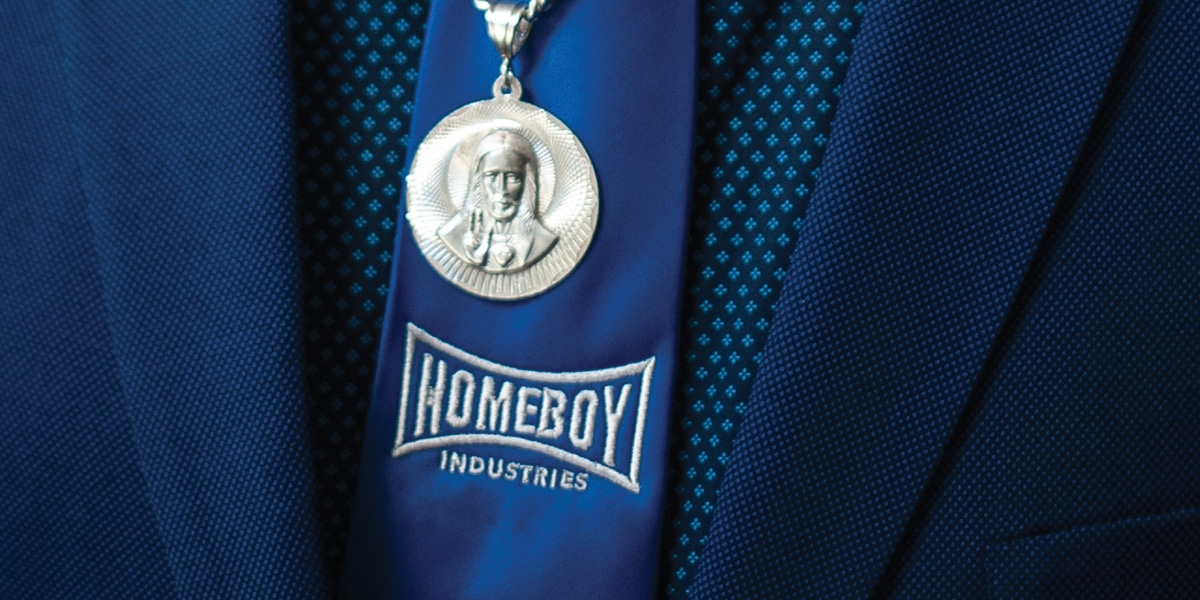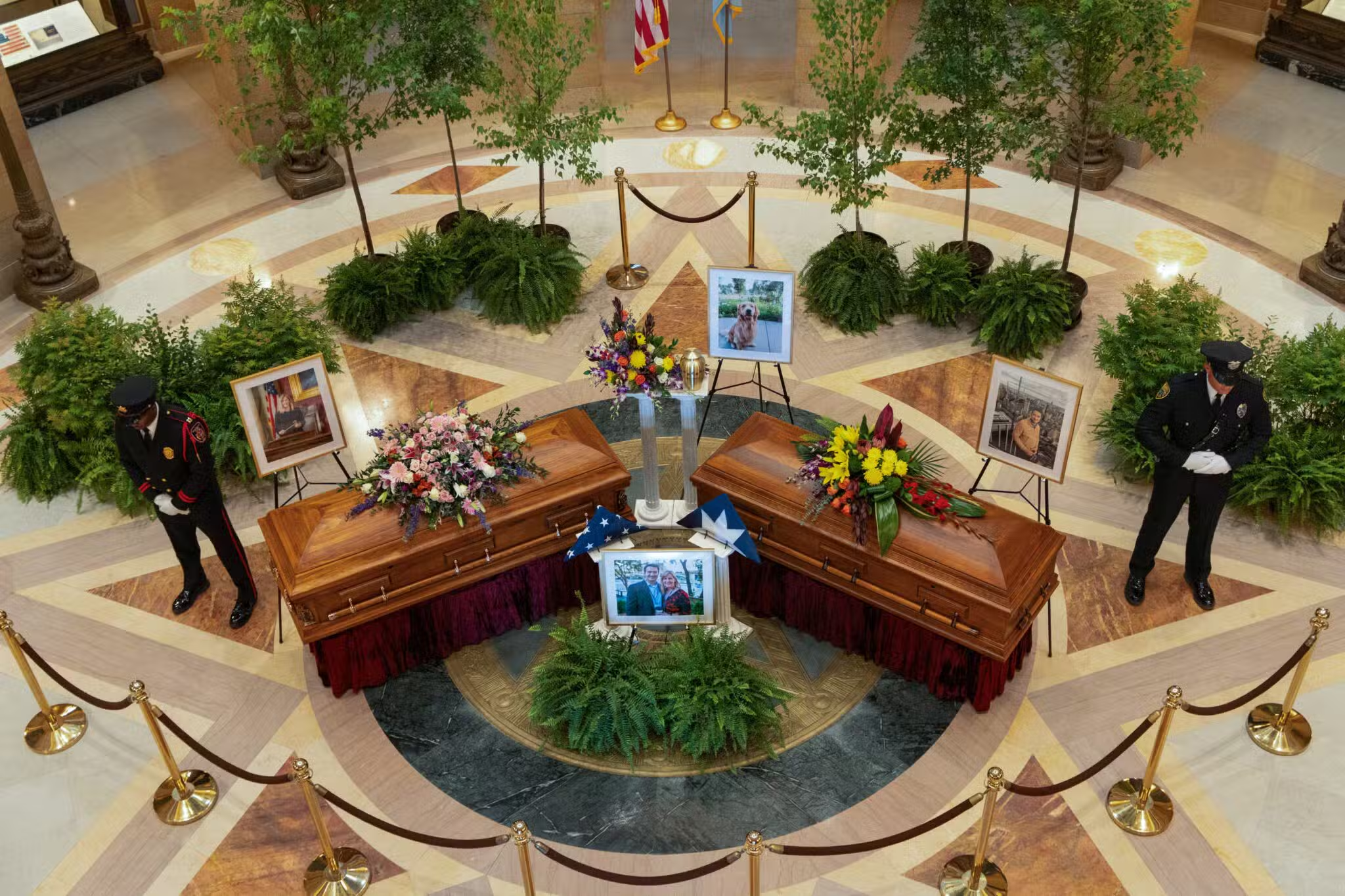Father Gregory Boyle, SJ, has built “a culture that heals” in a city plagued by gun and gang violence. His ministry has helped restore hope and reduce crime.
Growing up in South Los Angeles in the 1980s, Osvaldo Fernandez became involved with gangs and drugs at a young age, lured by a false “sense of belonging ” that felt akin to a brotherhood of sorts.
One day the native Angeleno experienced what could have been—or should have been—a transformative moment. A gang rival approached Fernandez while he was unarmed, pulled out a firearm, placed the barrel of a .45-caliber pistol against his forehead—and pulled the trigger.
“And nothing happened,” Fernandez recalls. “Then I reacted and slapped the gun away, and it went off [in the other direction]. And then I ran, of course, and he shot at me a couple of times. . . . God said, ‘It wasn’t your time’ . . . because that first bullet should have been in my brain.”
While that incident didn’t deter him from remaining on the wrong path—which eventually resulted in a 20-year prison sentence on drug dealing charges—today Fernandez, now 48, is determined to reclaim and rebuild his life. His goals: “To be there for my family, my marriage, [to work] and be a productive citizen in society.”
Helping him along that multi-pronged journey is a special LA-based nonprofit founded by a beloved Jesuit priest with a humble nature and a generous heart.
Modest Beginnings
In 1986, Father Gregory Boyle, SJ, was appointed pastor of Dolores Mission Church in the Boyle Heights neighborhood of Los Angeles. Surrounded by the highest concentration of gang activity in the city at the time, Dolores Mission was also the poorest Catholic parish in the Archdiocese of Los Angeles, with a predominantly Latino immigrant community.
For Father Boyle, that serendipitous appointment would light the embers of a revolutionary concept that would alter the course of his life and bring hope and healing to countless lost souls: treating gang members as children of God.
As a firsthand witness to the catastrophic impact of gang activity on his parishioners and the surrounding community, he recognized an important underlying truth: Hurt people hurt others.
Instead of ministering around them, Father Boyle began reaching out to young men and women on the margins: former gang members seeking to escape the seemingly endless cycle of violence, imprisonment, lost relationships, broken spirits, and dead-end futures—and willing to accept a helping hand to take that first step.
“If it’s true that the traumatized are going to be more likely to cause trauma, it’s equally true that the cherished will be able to find their way to the joy of cherishing themselves and others,” explains Father Boyle. “It’s not enough to say, ‘Just say no to gangs.'”
With that concept in mind, in 1988 Father Boyle—or “Father G” as he is affectionally known by many—launched Jobs for a Future with a simple goal: to help former gang members find jobs. That mustard seed soon sprouted. Over the past three decades, what began as a local ministry evolved into the highly regarded and widely known Homeboy Industries: the world’s largest gang-intervention, rehabilitation, and reentry program.
Lives Redirected
Homeboy Industries has stood as a beacon of hope in Los Angeles for more than 30 years, providing support services and job training to former gang members and previously incarcerated individuals. Their slogans are many, including “Nothing stops a bullet like a job” and “Hope has an address”—it’s literally 130 W. Bruno Street in downtown Los Angeles.
As a 501(c)3 nonprofit organization, Homeboy utilizes a combination of donations and revenue from various social enterprises to fund its innovative model of therapeutic wraparound services and training. It has a yearly budget of $28 million, and as of 2020 had a professional staff of more than 100, as well as nearly 150 professional volunteers.
Homeboy Industries currently welcomes more than 8,000 people who enter through their doors every year hoping to transform their lives. Its flagship 18-month training program is offered to more than 450 men and women annually.
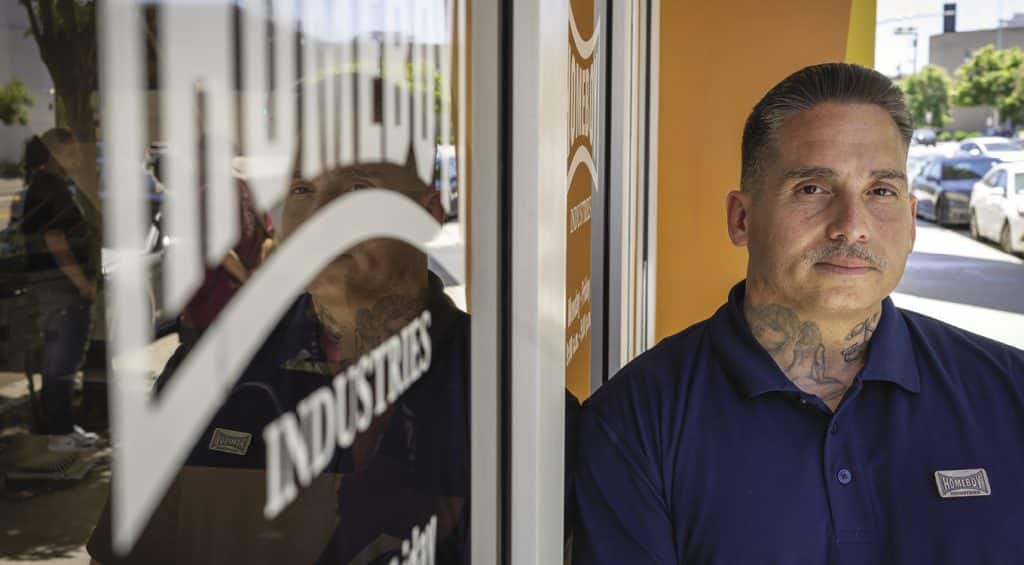
Trainee Osvaldo Fernandez, 48, is determined to rebuild his life after serving prison time for drug dealing.
The overall goal of the combined services and job training is to allow Homeboy trainees to discover their true selves and learn to make healthy lifestyle choices. By redirecting their lives, they can begin contributing to the well-being of their families and communities, and hopefully break the cycle of intergenerational trauma.
That’s what happened for Inez Salcido, a substance abuse counselor and case manager at Homeboy—who is formerly gang involved and in recovery from drug addiction. The 18-month training program changed the trajectory of her life, which had long been on a similar tragic path as her parents, who both died of complications stemming from years of drug use.
“I come from a long line of addicts and gang members. I was basically raised by the streets, by the neighborhood,” recounts Salcido, the oldest of four siblings who grew up in Southeast Los Angeles. “Growing up, it was a normal thing . . . for us to join the lifestyle.
“So that was my life from the age of 13 until [about my 30s],” she continues.
Not even the birth of her son in her mid-20s deterred her from remaining enmeshed in the life. After watching him grow up from afar (being raised by his dad), Salcido got a dose of tough love from her son: “If you’re not around, I’ll disown you—you [won’t be] my mom.”
“I just remember thinking, ‘Damn, I need to get [it] together,'” she recounts. But she let him down yet again and ended up incarcerated once more. During times of strife, Salcido had rarely turned to prayer because she would inevitably end up back behind bars. One day, it finally clicked: God was answering her prayers by taking her off the streets.
Today, thanks to the support of her family, Homeboy Industries, and plenty of prayers, Salcido has been clean and sober for nine years, and she now helps others in their recovery. Salcido is only one of countless success stories, and one of numerous former “homies” currently making a difference in the lives of trainees. According to Father Boyle, approximately two-thirds of Homeboy’s current senior staff members are themselves graduates of the program.
“I don’t run this place anymore; people who have come through the program run it all,” says Father Boyle. He recounts a presentation led by six homegirls and homeboys, while he was discreetly seated in the back. A woman in the crowd surprised everyone by asking, “Father Greg is going to die someday—what are you going to do after he’s gone?”
Not skipping a beat, one of the homeboys stood up, signaled the other five to stand as well, and replied, “All of us have keys to the place.” They received a standing ovation.
Unfazed by the Pandemic
The onset of the COVID-19 pandemic brought both surprises and challenges for Homeboy, as it did for the rest of the planet.
The mayor of Los Angeles deemed Homeboy an essential organization early on. Despite some initial disruption, they soon adopted all necessary safety protocols, and even set up a temporary canopied outdoor office for Father Boyle to help him continue his seemingly ceaseless stream of conversations of varying lengths with homies—both current and former—while addressing staff inquiries and welcoming visitors.
This was the bustling scene in late November 2021, with Father Boyle, workers, trainees, and volunteers back inside the fully functioning Homeboy headquarters. Inside, Father G sits front and center in a glass-enclosed office. On this crisp fall day, he’s in town, but soon he’ll be traveling again to any number of speaking engagements or promoting his latest book, The Whole Language: The Power of Extravagant Tenderness (see page 39 for a review of Father Boyle’s book).
As he chats with various people flowing in and out of his office, he seems energized and tireless, eager to answer questions and quick to smile. His engaging demeanor is contagious.
“We closed briefly, maybe for three months or something, while we figured out what was going on, like the whole world was,” recounts Father Boyle. They soon pivoted their food services to Feed Hope, providing meals to half a million people—seniors, homeless, and shut-ins in Los Angeles County.
Despite the myriad challenges created by COVID-19, grants, revenues, and donations—including major gifts—have been increasingly robust, notes Father Boyle.
The organization brought in $30.4 million in 2020, an increase of $8.6 million from the previous year. An unexpected boon came when Homeboy Industries was named the recipient of the 2020 Conrad N. Hilton Humanitarian Prize, increased from $2 million to $2.5 million in honor of the 25th anniversary of the award.
And the needed monetary support keeps coming. They received $15 million in funding from the State of California’s 2021‚ 2022 budget to further develop Homeboy’s workforce training and reentry program in partnership with the California Workforce Development Board (CWDB).
‘A Culture That Heals’
Homeboy’s current revenues and outreach stand in stark contrast to its modest beginnings, when the new endeavor not only had very limited resources, but also lacked support from a segment of the community that many find surprising, notes Father Boyle.
“In the early years, [we had] death threats, bomb threats, and hate mail—never from gang members, because we symbolized hope, but from folks who demonize gang members,” he says.
“Almost exclusively our hate mail was from law enforcement,” he reveals. “‘I am a sheriff. I hate what you’re doing, I hate who you are. You’re part of the problem here, not part of the solution.’ The [thinking was], ‘If only Father Boyle knew this population the way we do.'”
At issue was the mindset of us versus them, of “getting the bad guy,” which is the typical mentality among many who work in law enforcement, according to Father Boyle.
“[But] there are no bad guys; there [are] just people in pain or traumatized or mentally ill,” he explains, adding, “The largest mental institution on the planet is LA County Jail, so what does that tell you about how badly we address the societal dilemma?”
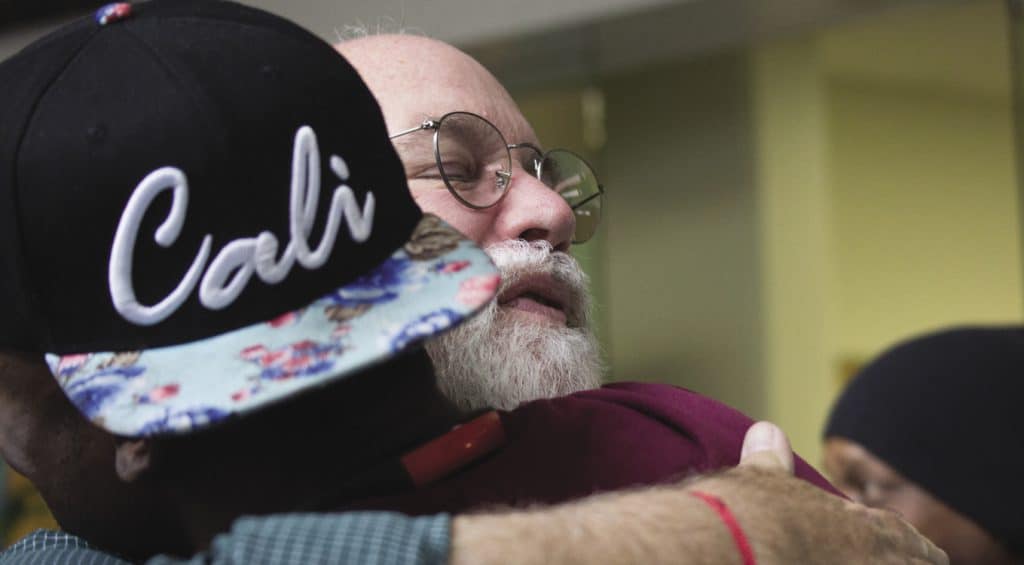
Father Greg Boyle, SJ, began ministering to gang members in 1986, when he became pastor of Dolores Mission Church, the poorest parish in Los Angeles. Today, “Father G ” continues to embrace those who come to Homeboy Industries as children of God.
In subsequent years, the chiefs of police grew “more enlightened,” recalls Father Boyle. The evidence, after all, was irrefutable. “In 1992, we had 1,000 gang-related homicides [in Los Angeles],” he says. “Well, what’s happened to that number? It was cut in half. And then cut in half again.
“I think we’ve had a singular impact on public safety. Singular,” emphasizes Father Boyle. “Before there was no exit ramp off of this crazy violent freeway—until this place came around. And suddenly gang members started to see people getting off the freeway.”
Unfortunately, the pandemic has had a negative impact on violent crimes nationwide, with homicides up by 30 percent in every major city across the country, including Los Angeles. “Violence and homicides are always about something else, so the trick is to find the something else. It shouldn’t surprise us that the baseline is really a lethal absence of hope,” explains Father Boyle. “The pandemic exacerbated the despair level.”
Addressing the increasing violence begins with examining its roots and acknowledging that those engaging in violence are not solely gang members or criminals; they are human beings.
“Everybody who comes through here is traumatized and really damaged, so how do we help them heal?” asks Father Boyle. “Society wants to punish the wound, but we say, ‘What if we sought to heal it?’
“We do that around here [at Homeboy]—everybody cherishes with every breath they take, and it’s a culture that heals, and it’s a relationship that heals,” he continues. “Maybe as a society we can too.”
The Marrow of the Gospel
Hand in hand with cherishing one another and embracing a culture of healing is an atmosphere immersed in Christ, though not necessarily in overt, traditional ways. After all, there is more than one way to proselytize, notes Father Boyle.
“There was a woman who [once asked] me, ‘How much time do you spend each day at Homeboy praising God?’ And I said, ‘All damn day,'” he recalls. “The whole place is soaked with the marrow of the Gospel; that’s all you get here. It’s part of the air you breathe.”
Someone else once asked him the question in a slightly different manner: “Do you bring gang members to Christ?” Father Boyle’s reply? “No, they bring me to Christ.” And living the true meaning of Christianity includes always leaving the door open to those genuinely seeking to change their lives, even if they have failed in their previous efforts.
Just like Fernandez. He is more than 12 months into his second attempt at completing the 18-month program. He was first hired as a trainee in 2018, shortly after completing his 20-year sentence. But his initial efforts at Homeboy were half-hearted, he admits now.
This time, Fernandez knows he will complete the program because he is putting in the extra time and effort he avoided the first time around, in particular embracing inner healing.
“If you don’t have that and you don’t work on it, then it’s a guarantee that you will fail and you will go back, or you’ll die; there’s no other gray area,” says Fernandez.
These are facts he knows all too well. When he left the program halfway through 2018, he went back to selling dope, ended up spending another year and a half in prison, and even survived COVID-19 while incarcerated. He was paroled on February 3, 2021, and the very next day he was back at Homeboy Industries, where he was welcomed with open arms.
“Now I’m gonna do the same things, but I’m gonna do it all in a positive way,” he says. And, as before, he’ll do it with the support of his family, his fellow homies, and Father G.
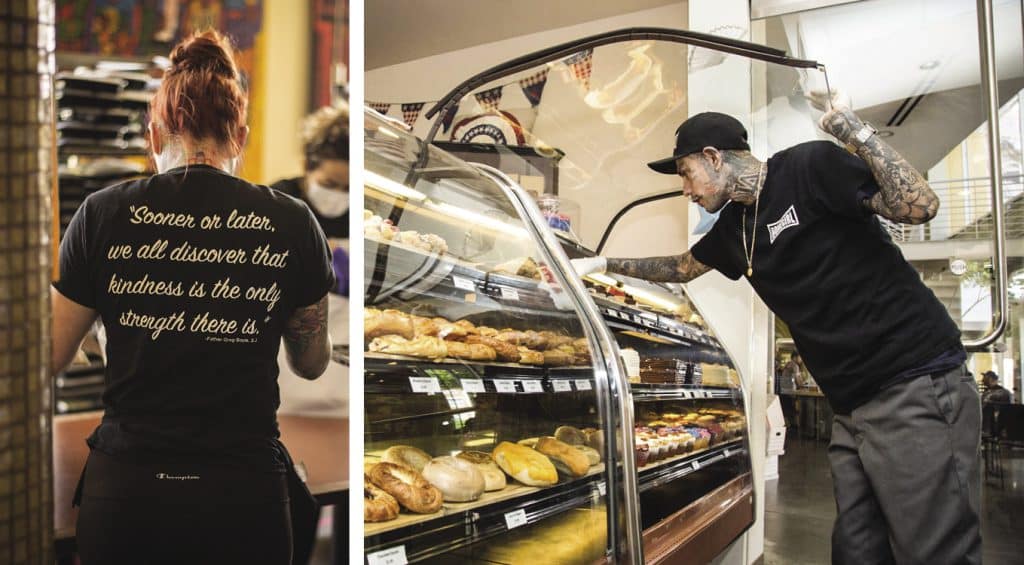
Trainees wear t-shirts produced by Homeboy Silkscreen and Embroidery, one of the organization’s 10 social enterprises.
Homeboy trainees receive hands-on opportunities to learn a variety of job skills while simultaneously earning a paycheck. There are 10 social enterprises at Homeboy Industries, such as:
- Feed HOPE
- Homeboy Bakery
- Homegirl Café
- Homegirl Catering
Trainees also benefit from a variety of services and educational programs, including:
- Tattoo removal
- Anger management
- Domestic violence support
- Youth Reentry services
- Educational services
- Homeboy Art Academy
- Legal assistance
- Mental health services
- Parenting classes
- Substance abuse support
For more information, visit: HomeboyIndustries.org/social-enterprises.


